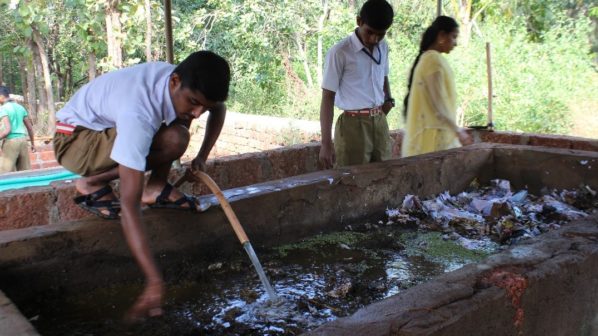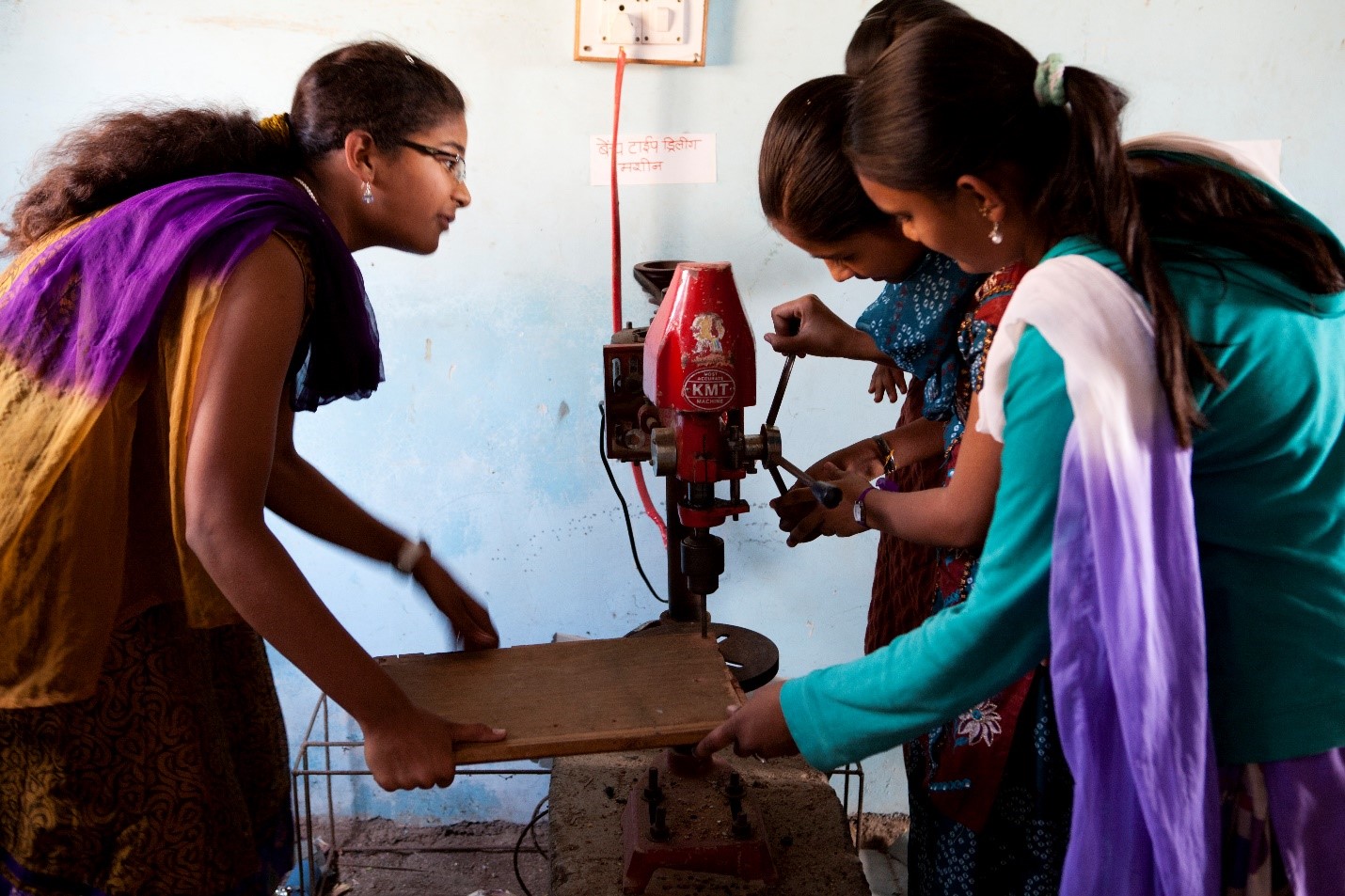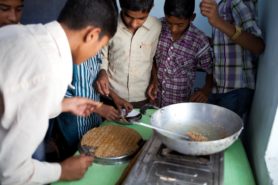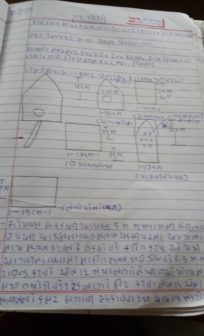Lend-A-Hand India works with thousands of secondary and higher secondary schools in Maharashtra, Gujarat, Madhya Pradesh, Karnataka, Goa, Uttar Pradesh and Andhra Pradesh to facilitate vocational training. The Multi-Skill Vocational Education Program is focused on making rural and economically disadvantaged students self-reliant through innovative training that can help them earn while they learn. Here are some stories from their vocational programs to show how the students picked up with skills and applied them in creating sustainable livelihoods, appreciating gender neutrality and overcoming learning disabilities through inclusive interventions.
Lend A Hand India’s work is currently supported by Ashmore Foundation, Credit Suisse, eClerx, EMpower Foundation, Forbes Marshall, Great Eastern CSR Foundation, JPMorgan Chase Foundation, Macquarie Group Foundation, SCA Foundation, UBS.
Vermiculture manure production as a means of creating sustainable livelihood
 Shree Devi Shantadurga High School is situated in Wadachapat village of Malwan block of Sindhudurg district of Maharashtra. Here students have taken up very interesting vocations that is helping their own programme in achieving a sustainability. They have created a Bio-compost pit wherein they prepare bio-manure. The bio-manure prepared by the students is of good quality, the processing is done exactly as per prescribed methods and procedure under the supervision of instructors. Once ready, this bio-manure is available for sale at the local market. The manure is packed in bags of two to five kilograms and sold. The income generated is used for partial funding of the MULTI SKILL VOCATIONAL EDUCATION programme in the school. This is one of the ways to make the MULTI SKILL FOUNDATION COURSE program self-sufficient. During academic year, 1500 kgs. of bio-manure worth Rs. 15000 was prepared and sold by the students of this school.
Shree Devi Shantadurga High School is situated in Wadachapat village of Malwan block of Sindhudurg district of Maharashtra. Here students have taken up very interesting vocations that is helping their own programme in achieving a sustainability. They have created a Bio-compost pit wherein they prepare bio-manure. The bio-manure prepared by the students is of good quality, the processing is done exactly as per prescribed methods and procedure under the supervision of instructors. Once ready, this bio-manure is available for sale at the local market. The manure is packed in bags of two to five kilograms and sold. The income generated is used for partial funding of the MULTI SKILL VOCATIONAL EDUCATION programme in the school. This is one of the ways to make the MULTI SKILL FOUNDATION COURSE program self-sufficient. During academic year, 1500 kgs. of bio-manure worth Rs. 15000 was prepared and sold by the students of this school.
Lend-A-Hand India promotes gender neutrality through Vocational Education


Lend A Hand India’s vocational education programme is an apt example of Gender Neutrality. One can observe boys making sugar syrup of right consistency, learning roasting, pickling; and girls working efficiently to fabricate a broken shelf or fixing electrical plug point. Naturally besides teaching a skill, MULTI SKILL FOUNDATION COURSE program creates adolescents who respect their counterparts and learn not to attach gender roles into work. These young minds when they grow up, promise to become creators of a gender balanced, appreciative society tomorrow, because this is how they have learnt to work and study together in their formative years.
Student’s Story: Inclusion through vocational skill building
This story is based on an interaction with a student with special needs (child with learning difficulty) at BK Bheda Govt. High School, Godhara, Mandvi, Kutch on 02.08.16.
Quote Scott Adams, “You don’t have to be a person of influence to be influential. In fact the most influential people in my life are probably not even aware of the things they have taught me.” The sentiment in these words can be experienced while interacting with Sahil Gulam Hussain, a 10th grade student at BK Bheda Govt. High School in Kutch district of Gujarat state.
Children with learning difficulties tend to get ignored, ridiculed or even bullied in an environment that is not sensitive enough to deal with such cases. This results in these children becoming withdrawn, reticent and most of the times dropping out from school. Due to lack of formal education such students grow up to become unemployed / underemployed adults and get pulled into the vicious circle of poverty. As a welcome relief from the typical forecast for cognitively challenged children in rural India, Sahil Gulam Hussain, aged 16 years, a 10th grade student at BK Bheda Government. High School has defied odds. This child has experienced several challenges in the regular, chalk and talk, method of teaching-learning. His handwriting is hardly readable, he speaks with a lisp, avoids eye contact with strangers and does not score very high ‘academic’ marks. In fact he barely manages to attain pass marks. But, he is a favourite of his vocational educator (his MULTI SKILL FOUNDATION COURSE instructor).
While he may not be scoring great marks in his regular studies, he is exceptionally good at MULTI SKILL FOUNDATION COURSE practical. Having completed Level I of the MULTI SKILL FOUNDATION COURSE, his favourite is the ‘Food Processing Techniques’ subject, where he gets to try out innovative recipes like roasting peanuts, baking a cake, preparing jams and pickles, etc. His second favourite is ‘Engineering Workshop’ which has helped him to mend a few broken benches at school and carry out some basic repair work at home. These skills have instilled a great sense of worth in him, because the end product is right in front of his eyes and for everyone else to see. It is a loud evidence to the fact that the child who could not do well in a regular class has learnt far better through practical training. Through the ‘Food Processing Techniques’ practical, he has understood basic concepts like preservation, germination, nutrition, etc. Similarly through the ‘Energy & Environment’ practical he has had an understanding of various renewable and non-renewable sources of energy, their importance and the need to balance the use of such energy. In the same way he has learnt measurements through his practical at ‘Workshop Engineering’ and has gained understanding of types of soil, soil testing, etc. hands on through his practical experience in the classes conducted under ‘Gardening, Nursery & Agriculture Techniques’. These are exactly the concepts that he is expected to study through textbooks!
 Sahil comes from a very humble financial background. His parents are casual labourers. Bringing up a child with special needs in such a household is traumatic. Especially because the level of difficulty is not tangible. The ‘difficulty’ that Sahil has can be experienced only after interacting with him. Sahil appears to be an undiagnosed case of either Dyslexia or Autism or probably a blend of both these cognitive limitations. None the less, in one farthest corner of the country, in spite of humble backgrounds and limited schooling opportunity, Sahil appears to be enjoying his education. Thanks to the untiring efforts of his vocational skills instructors and the spirit of Lend A Hand India behind all of the endeavour. Not to forget the school’s readiness to accept Vocational Education in mainstream curriculum.
Sahil comes from a very humble financial background. His parents are casual labourers. Bringing up a child with special needs in such a household is traumatic. Especially because the level of difficulty is not tangible. The ‘difficulty’ that Sahil has can be experienced only after interacting with him. Sahil appears to be an undiagnosed case of either Dyslexia or Autism or probably a blend of both these cognitive limitations. None the less, in one farthest corner of the country, in spite of humble backgrounds and limited schooling opportunity, Sahil appears to be enjoying his education. Thanks to the untiring efforts of his vocational skills instructors and the spirit of Lend A Hand India behind all of the endeavour. Not to forget the school’s readiness to accept Vocational Education in mainstream curriculum.
In spite of learning difficulties, there are many ‘Sahils’ in our country, attending school every day with a hope that ‘education’ will change their tomorrow for the better. While the ones from privileged backgrounds may have some support in terms of counselling and psychological intervention, most cases from vulnerable backgrounds are lost as drop-outs from mainstream education. This happens because the existing pattern of main stream education falls short in reaching out to each and every child with diverse needs in the classroom. It is time that we take note of the importance of the influence of practical, hands on training alongside all the knowledge that our children are expected to extract from the text book, chalk and talk.













Good info.